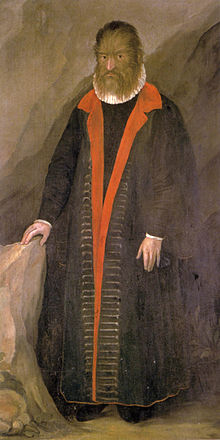Petrus Gonsalvus

Petrus Gonsalvus (Spanish: Pedro González; c. 1537, Tenerife – c. 1618, Capodimonte), referred to by Ulisse Aldrovandi as "the man of the woods",[1] was a gentleman in the court of Henry II of France. He was noted for having hypertrichosis, which led to him being known as the "wild gentleman of Tenerife" (salvaje gentilhombre de Tenerife) and the "Canarian werewolf" (hombre lobo canario). His life at various courts in Italy and France has been well chronicled.
Biography
Gonsalvus was born around 1537 in Tenerife, shortly after the conquest of the island by Alonso Fernández de Lugo. He was of Guanche descent.[2]
Gonsalvus first came to the court of Henry II, King of France in 1547 at the age of around 10, and was sent there as a gift from the court of Margaret of Parma, regent of the Netherlands.[2] He married while there; the name of his wife remains unknown, but it is believed she was named Catherine and that she may have been a lady-in-waiting to Catherine de' Medici. Later, he was moved into the court of Alexander Farnese, Duke of Parma. Four of his seven children were also afflicted with hypertrichosis universalis and painted.[3] His family became an object of medical inquiry by Ulisse Aldrovandi among others. Despite living and acting as a nobleman, Gonsalvus and his hairy children were not considered fully human in the eyes of their contemporaries and were gifted, like their father was, to other nobles as a sort of court pet. Gonsalvus eventually settled in Italy with his wife. The last known record of him is from 1617, when he was listed among those who had attended his grandson's christening. It is believed the marriage between Petrus Gonsalvus and Lady Catherine may have partially inspired the fairy tale Beauty and the Beast.[4][5]
He died in 1618 in Capodimonte near Rome. He was 81 years old.[citation needed]
Chamber of Art and Curiosities, Ambras Castle
The Chamber of Art and Curiosities, Ambras Castle collection in Innsbruck, Austria has a painting of Pedro González (Petrus Gonsalvus) as well as other people who display an extreme form of hirsutism, also called Ambras syndrome in 1933 in reference to its depiction at this collection.[6]
-
Petrus Gonsalvus and his wife Catherine by Joris Hoefnagel
-
Children of Petrus Gonsalvus by Joris Hoefnagel
-
Madelene Gonsalvas portrait 1580 Ambras collection
-
Henry Gonsalvas [Ambras Collection]
-
Agostino Carracci. Hairy Harry, Mad Peter and Tiny Amon. 1598. Capodimonte
References

- ^ Armand Marie Leroi, Mutants: on genetic variety and the human body (Penguin Books, Jan 25, 2005), also known as "the savage gentleman from Tenerife, Spain" 273.
- ^ a b Zapperi, Roberto (2006). El salvaje gentilhombre de Tenerife: La singular historia de Pedro González y sus hijos (in Spanish). Santa Úrsula: Zech. ISBN 9788493310875.
- ^ Chris Laoutaris, Shakespearean maternities: crises on conception in early modern England (Edinburgh University Press, 2008), 123.
- ^ Gender Construction in La Belle et La Bete
- ^ “La Bella y la Bestia”: Una historia real inspirada por un hombre de carne y hueso
- ^ Erche B (August 2008). "Der schlimmste Boesewicht der Walachei" (PDF). Weltkunst (in German): 7. Archived from the original (PDF) on August 16, 2009. Retrieved June 30, 2009.
External links
 Media related to Pedro Gonsalvus at Wikimedia Commons
Media related to Pedro Gonsalvus at Wikimedia Commons- Petrus Gonsalvus
- CS1 Spanish-language sources (es)
- CS1 German-language sources (de)
- Articles with short description
- Short description is different from Wikidata
- Articles containing Spanish-language text
- All articles with unsourced statements
- Articles with unsourced statements from January 2023
- Commons link is locally defined
- Articles with ISNI identifiers
- Articles with VIAF identifiers
- Articles with WorldCat Entities identifiers
- Articles with GND identifiers
- Articles with NKC identifiers
- Articles with SUDOC identifiers
- 1537 births
- 1618 deaths
- 16th-century German people
- 17th-century German people
- People from Tenerife
- People with hypertrichosis
- German people with disabilities
- Beauty and the Beast



![Henry Gonsalvas [Ambras Collection]](http://upload.wikimedia.org/wikipedia/commons/thumb/5/5d/16th-century_unknown_painters_-_The_Son_of_the_%22Hairy_Man_from_Munich%22_-_WGA23791.jpg/92px-16th-century_unknown_painters_-_The_Son_of_the_%22Hairy_Man_from_Munich%22_-_WGA23791.jpg)

